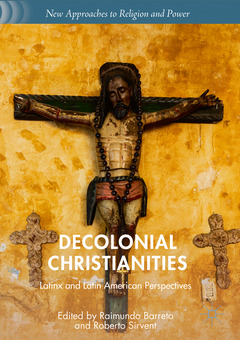Description
Decolonial Christianities, 1st ed. 2019
Latinx and Latin American Perspectives
New Approaches to Religion and Power Series
Coordinators: Barreto Raimundo, Sirvent Roberto
Language: English
Subjects for Decolonial Christianities:
Publication date: 11-2020
Support: Print on demand
Publication date: 11-2019
Support: Print on demand
Description
/li>Contents
/li>Biography
/li>Comment
/li>
What does it mean to theorize Christianity in light of the decolonial turn? This volumeinvites distinguished Latinx and Latin American scholars to a conversation that engages the rich theoretical contributions of the decolonial turn, while relocating Indigenous, Afro-Latin American, Latinx, and other often marginalized practices and hermeneutical perspectives to the center-stage of religious discourse in the Americas. Keeping in mind that all religions?Christianity included?are cultured, and avoiding the abstract references to Christianity common to the modern Eurocentric hegemonic project, the contributors favor embodied religious practices that emerge in concrete contexts and communities. Featuring essays from scholars such as Sylvia Marcos, Enrique Dussel, and Luis Rivera-Pagán, this volume represents a major step to bring Christian theology into the conversation with decolonial theory.
Roberto Sirvent and Raimundo Barreto, “Introduction”
Focal Essays
1. Enrique Dussel, “Epistemological Decolonization of Theology”
2. Luis N. Rivera-Pagán, “Towards a Decolonial Theology: Perspectives from the Caribbean”
3. Sylvia Marcos, “Mesoamerican Women’s Indigenous Spirituality: Decolonizing Religious Belief”
“Indigenous Dreams, Indigenous Resistance”
4. Jennifer Scheper Hughes, “Mapping the Autochthonous Indigenous Church: Toward a Decolonial History of Christianity in las Américas”
5. Verónica A. Gutiérrez, “Indigenous Christianities: Faith, Resilience, and Resistance among the Nahuas in Sixteenth-Century Mexico”
6. Michel Andraos, “Iglesia Autóctona: An Indigenous Response to Colonial Christianity”
“Decolonial Politics and Possibilities”
7. Yountae An, “Decolonizing the Cosmo-Polis: Cosmopolitanism as a Re-humanizing Project”
8. Néstor Medina, Indigenous Decolonial Movements in Abya Yala and Aztlán, Turtle Island: A Comparison
9. Matilde Moros, “Inversion and Diasporas: Decolonizing Racialized Sexuality
Transnationally”
10. Ángel F. Méndez Montoya, “¡Sin maricones no hay revoluciones! (Without queering, there’s no revolutioneering!): Mexico’s Queer Subversions of Public Space and the Decolonization of Marriage Heteronormativity”
“Decolonial Ecclesiologies”
11. Nicolás Panotto, “A Critique of the Coloniality of theological Knowledge: Rereading Latin American Liberation Theology as Thinking Otherwise”
12. Elizabeth O’Donnell Gandolfo, “Cuando el pobre crea en el pobre: Decolonial Epistemology in the Ecclesial Base Communities of El Salvador”
13. Ann Hidalgo, “Reimagining the Church as a Decolonial Ally: Pedro Casaldáliga’s Liturgies of Repentance”
Cláudio Carvalhaes, “A Decolonial Prayer, in lieu of a conclusion”
Raimundo Barreto is Assistant Professor of World Christianity at Princeton Theological Seminary.
Roberto Sirvent is Professor of Political and Social Ethics at Hope International University in Fullerton, California.
Addresses questions about how Christianity can still be possible after colonialism and empire
Offers an important contribution to the field of decolonial thought by drawing on ecumenical and theological voices
Forms a critically constructive conversation which highlights the perspective of decolonial Christianities in North America

